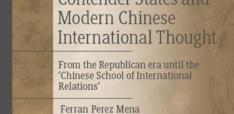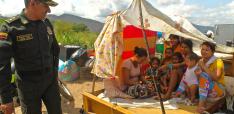Japan’s Tussle Over Immigration: An interview with GGF 2030 fellow Naoko Hashimoto

This interview was conducted by the Global Governance Futures – Robert Bosch Foundation Multilateral Dialogues, which brings together young professionals to look ahead 10 years and recommend ways to address global challenges.
In your doctoral thesis, you analyze why countries that usually restrict immigration accept refugees through resettlement. Japan, which has long been known to be less open toward immigration, voluntarily launched a refugee resettlement scheme in 2008. Why did it decide to do this?
Although it is difficult to provide a short answer, I would say that my empirical and historical case study on Japan suggests that the resettlement project was introduced as an ‘alternative’ to asylum, so to speak. Japan’s restrictive asylum policy has damaged its international reputation, but the government has not been keen to relax its strict standards for assessing asylum applications. Resettlement is an appealing option because the procedure allows the receiving government to control the entire process, from selection to integration. The decision to implement this policy derives from Japan’s quest to retain full sovereignty over how it manages migration. And this is the rationale of more and more states around the world. In fact, my studies on the global refugee protection trend in recent years have found that this tendency to use resettlement as an alternative to the asylum route has become quite common in various corners of the world. An increasing number and variety of states has launched resettlement projects over the past 10 years.
 Japan faces a number of demographic issues, including low fertility rate. Still, the government is reluctant to accept more refugees and only ready to ease immigration procedures for highly skilled migrants. How much of this, do you think, has to do with the urge to preserve the uniqueness of Japanese culture and identity that is often associated with Japanese society?
Japan faces a number of demographic issues, including low fertility rate. Still, the government is reluctant to accept more refugees and only ready to ease immigration procedures for highly skilled migrants. How much of this, do you think, has to do with the urge to preserve the uniqueness of Japanese culture and identity that is often associated with Japanese society?
First of all, I would like to distinguish between the rationale of admitting migrants in general and that of admitting refugees specifically. The former has a lot to do with the demographic and labor shortage problems that Japan has been facing, while the latter should be respected regardless of such issues, at least in principle. It is true that Japan is generally allergic and hostile to the idea of admitting a large number of foreign migrants, including refugees. The country only allows for a small number of so-called highly skilled migrants. This tendency could be partly due to a myth of societal homogeneity that the majority of Japanese people still strongly hold on to. Another reason could be the historical memory of the Sakoku policy, which completely isolated Japan from the outside world and which was employed in Japan for more than 200 years, until the mid-19th century. The narrative that the country’s unique culture, tradition, and language were developed and preserved thanks to Sakoku still exists. However, it is obviously impossible and impractical to romanticize and maintain such an insular policy nowadays, both due to the reality of globalization and the impending demographic crisis. In my opinion, if the country is to sustain its economic, industrial, and social welfare infrastructure, the Japanese government will need to roll out a more robust immigration policy relatively soon.
How can we create a system that ensures a better distribution and regulation of refugee flows?
In terms of distribution, the key is to achieve a more justifiable and equitable redistribution of the burden of hosting forced migrants. This can be done through promoting resettlement or transferring more resources (most notably money) from richer countries to poorer countries. The latter tend to host nearly 80 percent of the world’s forced migrants. Meanwhile, regulation of refugee flows can be a double-edged sword. More regulation could mean less access to asylum for those who have well-founded fear of persecution, although it could also mean a safer, legal, and orderly movement of such populations. In my opinion, the best solution to address both the distribution and regulation challenges is two-fold: first, countries should promote the possibility of in-country asylum application procedures whereby those with well-founded fear of persecution can apply for asylum while still in their country of origin. This would eliminate the need to resort to illegal border crossings. Secondly, there is a need for more robust and largescale resettlement commitments around the globe. Resettling one million refugees per year should be perfectly feasible if we can achieve the collective political will.
You are a fellow in the GGF 2030 program, where you participate in the working group on the global migration and refugee challenge, together with fellows from nine different countries. Did your interaction with these fellows, all from different cultural backgrounds, change or challenge any of your assumptions and perceptions on the topic?
With the caveat that we’ve only just finished the first session in Washington, DC, my first impression was that all nine fellows in my working group hold a relatively similar view about forced migration issues in general, despite coming from different countries and having different backgrounds and experiences. For instance, none of us is against the idea of achieving a more equitable redistribution of vulnerable forced migrants. This could be both a strength and a weakness of the group, since our policy proposals will ultimately have to be convincing even in the eyes of policymakers and members of the general public, some of whom may not necessarily embrace liberal or humanitarian ideas. Secondly, I feel extremely blessed to have one fellow in our group who has direct and personal experience with forced migration. Regrettably, those who work on forced migration issues -both academics and practitioners - tend to discuss refugee issues without involving refugees themselves. So I’m really glad this fellow applied and was selected!
Naoko Hashimoto doctoral candidate at the University of Sussex (International Fellow of Nippon Foundation), a research associate in the Refugee Law Initiative at University of London and is a Global Governance Futures 2030 fellow. The views expressed here are her own.
Image credit: Pedro Szekely via Flickr (CC BY-SA 2.0)

